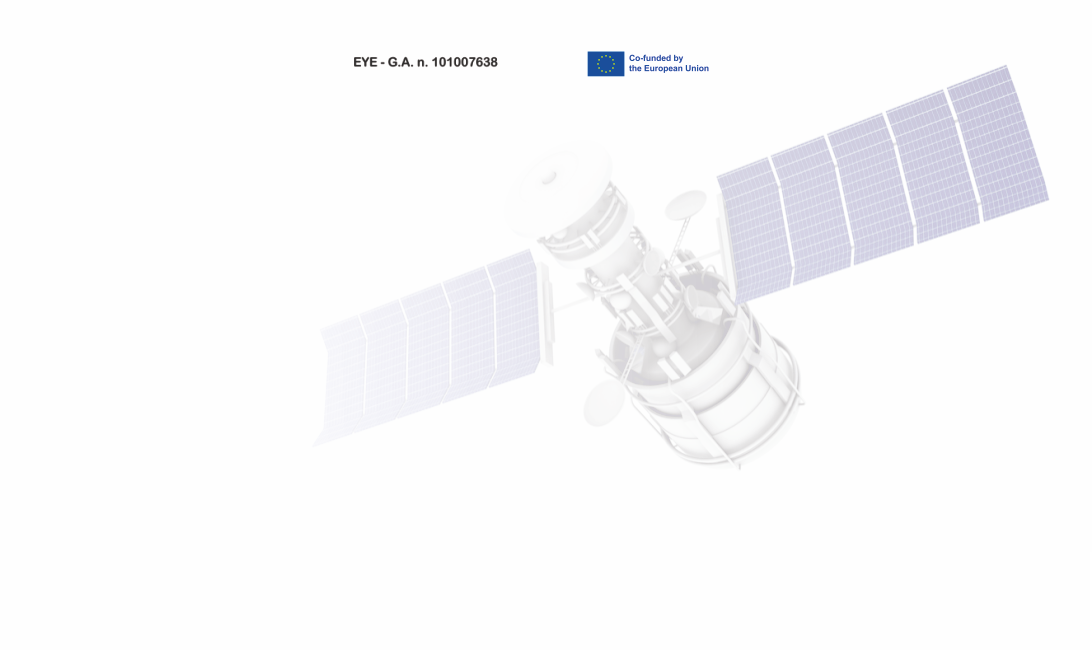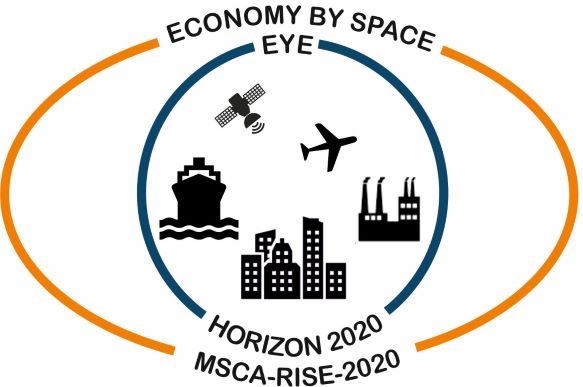Partners of Economy bY spacE (EYE) project










Alma Sistemi
ALMA Sistemi Srl is an Italian SME established in 2005 providing high level consultancy in the space and defence market for industries and research centres. ALMA provides services in Project and Proposal/Bid Management, Business development, market analysis, System and Software Engineering in the frame of European Space Agency, European Union and Italian Space Agency programs.
The activities of ALMA spans from international RTD projects managed by research organizations to industrial projects covering: added value services in the space market, Earth Observation and Navigation Applications and Check–out equipment for satellite and payloads.
Activities are carried out by Alessio Di Iorio, Managing Director and major stakeholder with the support of core team of engineers and a network of professionals engaged on a project basis.
ALMA operates in high-value, high technology areas focusing on helping clients to exploit new technologies and management styles. Its proven expertise has been acquired by performing a broad range of projects in the: Aerospace, Engineering, Research and IT sectors. These include helping research organisations and industries to identify potential opportunities, make project proposal and development plan of new products and services, the analysis and preparation of marketing strategies, implementation of management and quality standards and developing sustainable development strategies.
Complutense
The Complutense University of Madrid (Spanish: Universidad Complutense de Madrid; Latin: Universitas Complutensis Matritensis) is a public research university located in Madrid. Founded in Alcalá in 1293 (before relocating to Madrid in 1836), it is one of the oldest operating universities in the world. It is located on a sprawling campus that occupies the entirety of the Ciudad Universitaria district of Madrid, with annexes in the district of Somosaguas in the neighboring city of Pozuelo de Alarcón. It is named after the ancient Roman settlement of Complutum, now an archeological site in Alcalá de Henares, just east of Madrid.
It enrolls over 86,000 students, making it the third largest non-distance European university by enrollment. It is one of the most prestigious Spanish universities and consistently ranks among the top universities in Spain in International and European league tables and surveys. Since its foundation, it has attracted numerous scholars, intellectuals and students from all over Spain and the world, establishing itself as one of the main international centers of learning. By Royal Decree of 1857, the University of Madrid was the first and only institution in Spain authorized to grant doctorate degrees throughout the Spanish Empire.
In 1909, the University of Madrid became one of the first universities in the world to grant a doctorate degree to a woman.
Creotech
Creotech Instruments is Poland’s leading manufacturer of satellite systems and components, as well as advanced electronics for quantum computer control systems and other applications. The company is also pursuing the development of unmanned aerial systems delivering hardware and software for, among others, drone operations management.
The Company operates its own electronics manufacturing plants and small satellite integration facilities. Creotech Instruments S.A. boasts a portfolio of 26 completed projects for the space sector, including 14 space missions with Creotech-made hardware, four of which were carried out for the European Space Agency.
CSEO
The Cyprus Space Exploration Organisation (CSEO) is a space research institution and space association, based in Cyprus, with a global scope of activities, focused on RTDI, capacity building and education. It bridges international collaboration in space initiatives, hosting international space science entities - such as the Mars Upper Atmosphere Network (MUAN) and an International Astronomy Education Center of the International Astronomical Union.
CSEO has strong experience in conducting RTDI programs that combine science, engineering, innovation and entrepreneurship, stimulating technological innovation and regional collaboration.
It has over 1000 registered researchers, scientists, educators and volunteers and a global dissemination network of over 300,000 people in the fields of space sciences. CSEO has multiple spinoffs and subsidiary companies, and supports and promotes startups and technological innovation.
CSEO’s companies, researchers and teams are skilled in Earth Observation, ICT, Robotics, Electronics, Computer Vision, Aerospace Engineering, Astrophysics, Planetary Sciences, Environmental and Climate Sciences, Energy, Mechanical, Structural, Materials, Medicine, Bioengineering, etc.
CSEO's International Council comprises some of the world’s most distinguished individuals that are highly decorated for their contribution to space exploration and astronomy.
Geosystems Hellas
Geosystems Hellas S.A. [GSH] is a Greek SME focused on the development of Earth Observation Monitoring Solutions, established in November 2009 as the newest member of GEOSYSTEMS EU GROUP (www.geosystems-group.eu).
GSH has three main activities:
· Acting commercially as Hexagon Geospatial and Hexagon Airborne Solutions authorized reseller and as consultant in Greece and Cyprus on subjects of Photogrammetrical, Remote Sensing, Geodetic and Environmental Monitoring projects working also with Big Data. GSH is focused on industrial projects covering added value services in the space market including Earth Observation and Navigation Applications, business development and Project Management support.
Participating in service projects, Enterprise Solutions/Smart M.Apps, Smart Cities/IoT Technology Trends and in R&D projects based on the above expertise.
GSH has 12 highly skilled engineers in the core team and a network of professionals engaged time by time on a project basis. GSH is working on commercial Environmental, Photogrammetrical, Remote Sensing projects and R&D projects for land management, crisis management and Spatial Data Infrastructure (INSPIRE Directive) implementations. GSH is deeply involved in Big Data and Data Fusion and Data Analytics techniques for National projects and establishment of infrastructure for spatial information (Metadata, Data Specifications, Data and Service Sharing and Monitoring and Reporting). Additionally, GSH holds extensive expertise in regards to operational requirements/scenarios definition in fields of data exchange/sharing in an interoperability manner. GSH is a member of EARSC, HASI and a funded member of si-cluster.
S3
S3 – Space Systems Solutions Company was established in 2016 with a focus of developing a space sector in Cyprus. S3 brings together key individuals from around the globe bringing a unique set of skills and disciplines. In only 3 years S3 got involved in a number of space-based missions and in the development of spaceborne technologies that have strong potential terrestrial and societal applications. The company’s collaborators and partners have collectively more than 100 years experience in space technology and Earth resources remote sensing. S3 is also involved in a number of activities concerned with Drone development and utilization. The general objectives of the project are to develop a system that intercepts drones using audio and radio frequencies and to promote the system globally. This project offers a complete solution, integrating the state of the art of the passive and active detection technologies with an optional jamming active counter system able to completely stop both communications and onboard GPS signal processing.
S3 has established and maintains a number of strong international collaborations with universities, laboratories and Companies that help enlarging and consolidating the already vast portfolio of competences of our company. The general objective of the project is to develop a simple and economical airborne solution to the airport’s identification of Foreign Object Debris from the runway and its surface mantle status. FOD (Foreign Object Debris) is an acronym that indicates any foreign body present on the pavement that could potentially damage an aircraft, during taxing, lift of or landing phases, causing a danger to flight safety.
S3 has also developed interest in Air-borne Remote Sensing for Oil Search by means of Gravimeters, Accelerometers and Magnetometers. Proposals have been submitted to a number of governments. S3 continues to propose to EU, ESA and other international organizations actively seeking business opportunities
University of Thessaly
University of Thessaly (UTH) was founded in 1984. UTH is a prominent institution of Higher Education aiming to promote scientific knowledge through teaching and research, and to contribute to the cultural and economic development of the local community, and the society at large. It promotes scientific and academic excellence in all fields of expertise and rewards outstanding individual performances, establishing new scientific research units and fostering an environment that supports innovative actions.
The Laboratory of Hygiene and Epidemiology (University of Thessaly-UTH) functions from 2003 and belongs to the Medical Department of the University of Thessaly, Greece. It is the WHO Collaborating Centre for the International Health Regulations: points of entry since 17/02/2014 (WHO Reference Number GRE-27). It has undertaken innovative research projects related to environmental health, hygiene and communicable diseases in relation to maritime sector and participated in field investigations on board ships. It has coordinated the development of information systems for public health surveillance data and the European information system for recording Ship Sanitation Certificates and for data exchange at national and international level in relation to health events in the maritime transport.
Concerning the staff specialties, the department employs epidemiologists, microbiologists, chemists, statisticians, biochemists, public health officers and engineers.
University of Tor Vergata
University of Rome Tor Vergata was established in 1982 and is therefore a relatively young University. The mission of the University of Rome Tor Vergata is to contribute to people’s education and training, to scientific research and to the technological, organisational and social innovation needed to achieve a truly sustainable development in Italy, Europe and worldwide pursuant to the Sustainable Development Goals approved by the United Nations in September 2015. Tor Vergata aims at playing a leading role in research and education, as well as in technological, economic, organisational and social development in order to become not only a ‘sustainable University’ but also one of the best European Universities by 2025.
University of Rome Tor Vergata is committed to being an open space to develop advanced and high-quality knowledge, lifelong learning and training for youngsters and adults, to conceive and experiment innovative solutions hence achieving sustainable development.
University of Wroclaw
Wrocław University of Environmental and Life Sciences (UPWr) is one of the best specialist universities in Poland. It conducts training and research in the field of agricultural and natural sciences as well as the engineering and technical ones.
Wrocław, located in south-west Poland, is one of the fastest-growing cities in the country, a place of diverse industry, wide range of services and good access to cultural life. Wrocław is also an academic city where 30 universities and colleges educate approximately 110 thousand students each year.
UPWr has nearly 1.6 thousand employees, educates 8 thousand students and almost 200 doctoral students. It offers 28 degree programmes at 5 faculties, and – in accordance with the idea of lifelong learning – 22 post-graduate studies, Open University of the Third Age, courses, trainings and activities for children.
In the area of research and scientist employment, UPWr follows the standards of the Human Resources Excellence in Research logo, awarded to the University by the European Commission in 2017, and in the didactic area it strives to provide education able to meet the current requirements of the labour market.
Every year, Wrocław University of Environmental and Life Sciences is listed among the universities with the largest number of patents. Of the five international scientific and research projects currently carried out at UPWr under the Horizon 2020 programme, SynBio4Flav has obtained over 500 thousand EUR of funding, and Gathers became the best-evaluted project in Europe financed in the amount of over 800 thousand euros. As part of its cooperation with business, the University commercializes research results and know-how.









